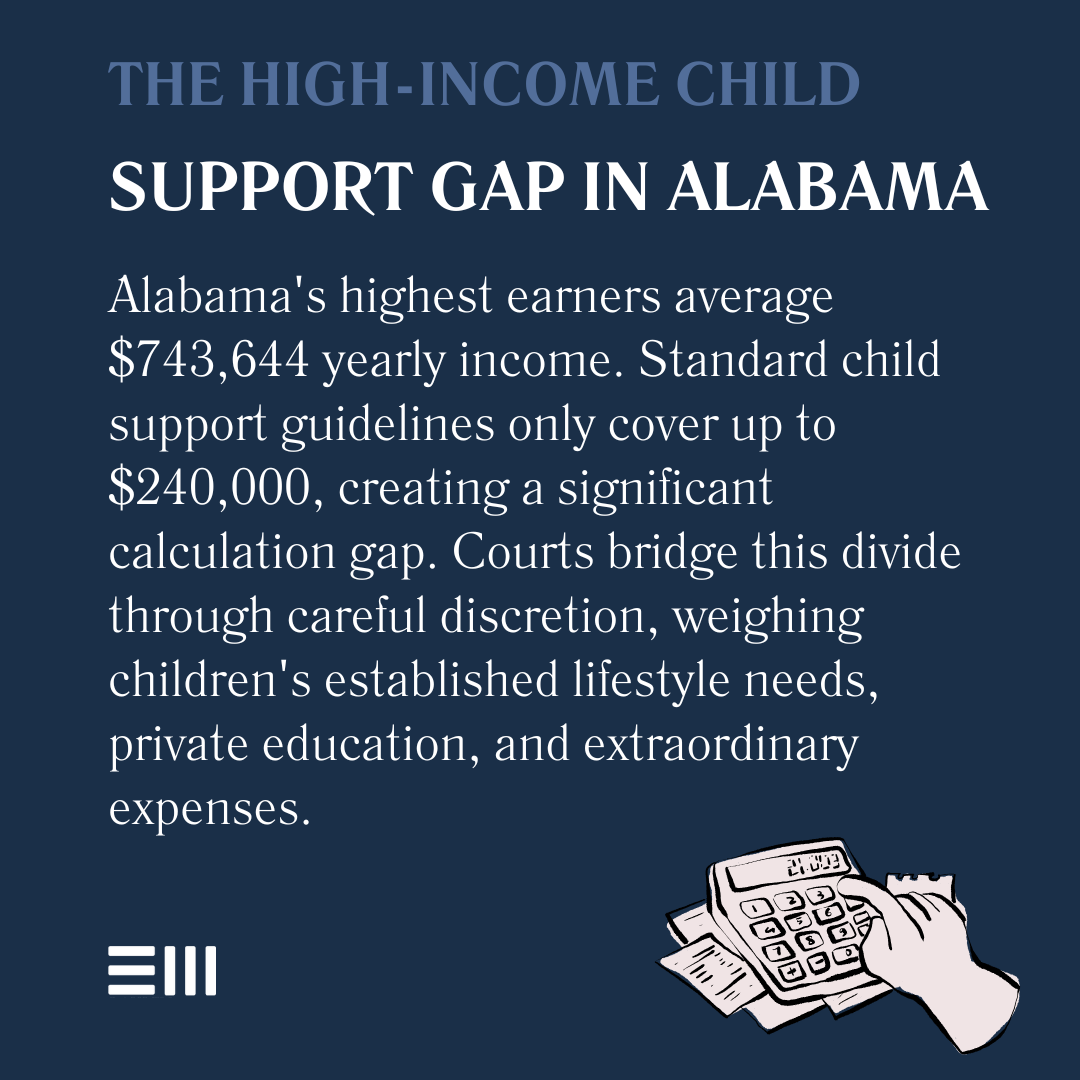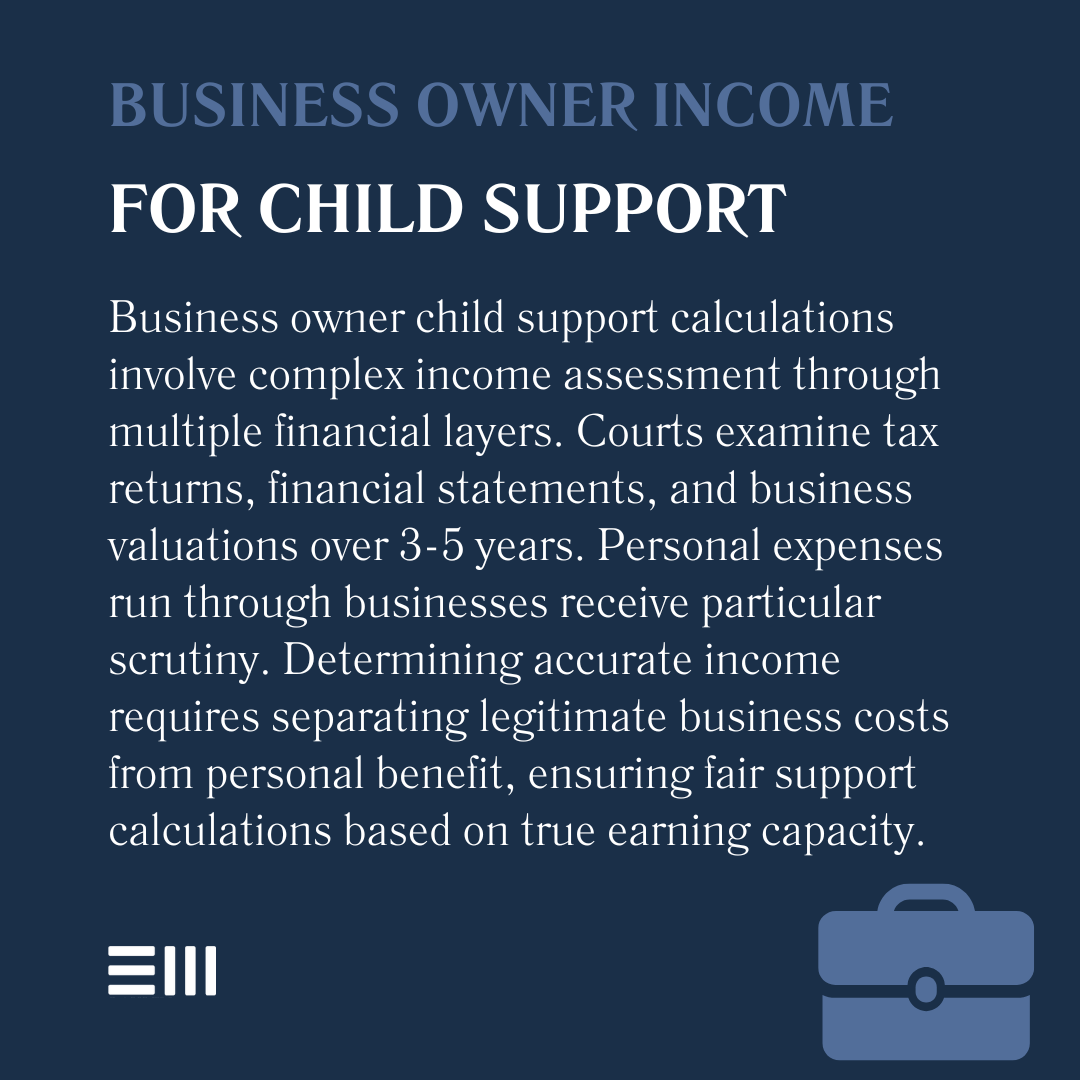In Alabama, the top 1% of earners average $743,644 annually, yet the state's child support guidelines only explicitly address income up to $240,000 per year.
This disconnect creates unique challenges for high-earning parents navigating child support obligations.
As income levels soar beyond standard guidelines, courts must carefully balance children's needs with fair support determinations, particularly in affluent areas like Mountain Brook, Vestavia Hills, and Homewood.
Understanding High-Income Child Support in Alabama
High-income child support cases in Alabama require specialized consideration beyond standard guidelines.
The Alabama Rules of Judicial Administration Rule 32 establishes baseline calculations, but courts exercise significant discretion when parents' combined income exceeds $240,000 annually.
This discretion becomes particularly important in cases involving business owners, medical professionals, and corporate executives across Birmingham, Huntsville, and Mobile.
The following factors significantly impact high-income child support determinations:
- Children's established standard of living during marriage, including considerations for private schools like UMS-Wright Preparatory School or Alabama School of Fine Arts;
- Special needs, including private education, extracurricular activities, and specialized medical care;
- Parents' respective earning capacities and financial resources, including potential future earnings;
- Tax implications and financial planning considerations, particularly for complex investment portfolios;
- Additional expenses like health insurance, medical costs, and childcare;
- Travel and transportation costs, especially in cases of joint custody across different cities; and
- College savings and future educational planning.
Courts strive to maintain children's quality of life while ensuring support amounts remain reasonable and justified. This complex balancing act often requires detailed financial analysis and expert testimony from forensic accountants and financial planners.
Key Considerations for High-Income Earners
Before diving into specific calculations, high-income parents should understand several fundamental aspects of Alabama's approach to child support.
These insights help create realistic expectations and inform strategic decisions throughout the legal process.
Important considerations include:
- Income sources beyond salary, including bonuses, stock options, and investment returns from Alabama-based companies;
- Impact of business ownership and self-employment income, particularly relevant for medical practices and professional services firms;
- Treatment of inherited wealth and trust distributions under Alabama law;
- Role of prenuptial agreements in child support determinations and their enforceability;
- Tax planning strategies and implications, including recent changes affecting high-income earners;
- Requirements for financial disclosure and documentation in Alabama courts;
- Impact of remarriage and additional dependents on support calculations;
- Treatment of passive income from real estate and other investments; and
- Consideration of executive compensation packages and deferred compensation.
Understanding these factors helps parents better navigate negotiations and court proceedings while ensuring fair outcomes for their children.
How Courts Calculate Support for High Earners
Alabama courts follow specific procedures when determining child support for high-income cases. This structured approach helps ensure consistency while allowing flexibility for unique circumstances, particularly in complex financial situations.
The calculation process typically involves:
- Determining all sources of income and their treatment under guidelines, including seasonal or variable income;
- Evaluating children's reasonable needs and lifestyle expectations based on historical spending patterns;
- Assessing extraordinary expenses and special circumstances unique to high-income families;
- Considering deviation factors from standard guidelines, including travel costs and private education;
- Analyzing tax implications and net disposable income across different income scenarios;
- Evaluating potential future income changes and modifications based on career trajectories;
- Examining historical spending patterns and lifestyle choices during marriage;
- Considering regional cost-of-living differences across Alabama; and
- Assessing the impact of business cycles on variable income.
This comprehensive evaluation ensures support orders reflect both parents' financial capabilities while prioritizing children's best interests and maintaining consistency with Alabama legal precedents.
Common Questions About High-Income Child Support in Alabama
High-income child support cases often raise complex questions.
Here are answers to frequently asked concerns from Alabama parents navigating this process.
How Are Bonuses and Commission Income Handled?
Variable compensation requires careful consideration. Courts typically average past earnings while accounting for future projections.
Some orders include percentage-based provisions for bonuses and commissions to ensure fair distribution of fluctuating income.
In Alabama, judges often consider 3 to 5 years of historical data to establish patterns.
What Happens When Income Exceeds Guidelines?
Courts exercise discretion based on children's needs and lifestyle considerations.
Judges may extrapolate from guidelines or create custom formulas accounting for specific circumstances and reasonable expenses.
Recent Alabama cases have established precedents for handling ultra-high-income situations.
Can Support Be Modified if Income Changes?
Yes, substantial income changes may justify modification. However, voluntary income reduction rarely warrants decreased support.
Courts carefully examine circumstances behind income changes when considering modifications, particularly in cases involving business ownership or career changes.
How Are Business Owner Incomes Calculated?
Business income assessment involves analyzing tax returns, financial statements, and business valuations.
Courts consider reasonable business expenses while scrutinizing personal expenses run through businesses.
Alabama courts often require detailed documentation of business practices and income allocation.
What Role Do Private School and Extracurricular Activities Play?
These expenses often receive special consideration in high-income cases. Courts evaluate historical patterns, educational needs, and parents' agreements regarding such activities.
Alabama judges typically consider the availability and quality of local public schools when making these determinations.
Take Control of Your Child Support Situation
Don't leave your personal property distribution to chance. Our experienced estate planning attorneys will help you create a comprehensive plan that honors your wishes and preserves family harmony.
Schedule a consultation to discuss your personal property distribution needs. We'll help you develop a tailored estate plan that protects your legacy and provides peace of mind for you and your loved ones.


